News 9/4/20
Top News

Boston-based Biofourmis raises $100 million to further develop its predictive analytics-based remote patient monitoring technology.
The company sells data and intervention opportunities to drug companies and offers hospitals a platform for monitoring their newly discharged patients remotely.
The company’s products have earned FDA 510(k) clearance for heart failure and arrhythmia detection.

Biofourmis uses Biovotion’s Everion armband sensor, which monitors 22 parameters, including heart rate, temperature, respiratory rate, blood oxygenation, motion intensity and steps, energy expenditure, sleep quality, and heart rate variability. Biofourmis acquired Biovotion in November 2019.
Reader Comments
From Significant Brother: “Re: remotely hosted EHRs. A practice asked their hosting vendor why the information of 50,000 of their patients was missing. The vendor told them that someone in the practice had deleted multiple directories. Should a vendor’s security practices allow records to be deleted by the thousands, especially in light of MU and HIPAA requirements for protecting patient records?” Readers, please weigh in. We’re missing an important piece of the story here — did the vendor identify the employee, were that user’s credentials maintained properly by the customer, and were backups or logical (rather than physical) deletes not available for restoring the missing records? Healthcare has seen a few instances where a fired employee trashed company data, and cloud configuration might allow limiting the extent of their destruction. But if the practice fired someone without turning off their access, or if they are sloppy in giving users more privileges than their jobs require, then that’s the age-old issue of running a business like something other than a business.
From Transmaniacon: “Re: COVID testing technology. I’m interested in a cloud-based patient registration system – basically a lightweight EHR – that can be installed quickly and easily to send results back to the person. Maybe you know of something.” I’ll enlist reader help here.
HIStalk Announcements and Requests
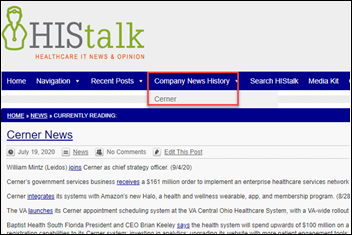
Jenn is continuing to update the Cerner-specific news page for: (a) those who care mostly about only Cerner news, and (b) those who want to see a longitudinal view of previous, significant news from the company. These items have already been vetted and summarized by appearing in HIStalk, so it’s not just regurgitated fluff. I also added a menu item called “Company News History” that lets you jump to that page, and maybe later to similar news summary pages for Epic, Meditech, and Allscripts. Somebody who asked for this years ago expressed interest in sponsoring this particular page and of course I didn’t retain that information because I lack discipline, so let me know if that was you.
Webinars
September 9 (Wednesday) 1 ET: “APIs for Data Liquidity in Pandemic Times.” Sponsor: Chilmark Research. Presenters: Brian Murphy, research director, Chilmark Research; Gautam “G” Shah, VP of platform and marketplace, Change Healthcare; Drew Ivan, chief product and strategy officer, Lyniate; and Dave Levine, MD, co-founder and chief medical officer, Datica. This webinar will present the findings from a recently published research report on the state of the healthcare API market. The presenters will describe their work in deploying APIs to enable new functionality to address COVID-19. They will cover the use cases that have been most reliable for enabling effective data liquidity, how developers are using APIs to respond to the pandemic, and how different parts of the healthcare system are making APIs more widely available.
September 17 (Thursday) 1 ET. “ICD-10-CM 2021 Updates and Regulatory Readiness.“ Sponsor: Intelligent Medical Objects. Presenters: June Bronnert, MSHI, RHIA, VP of global clinical services, IMO; Theresa Rihanek, MHA, RHIA, mapping manager, IMO; Julie Glasgow, MD, clinical terminologist, IMO. IMO’s top coding professionals and thought leaders will review additions, deletions, and other revisions to the 2020 ICD-10-CM code set that will be critical in coding accurately for proper reimbursement.
Previous webinars are on our YouTube channel. Contact Lorre to present your own.
Acquisitions, Funding, Business, and Stock

Nordic lays off 72 of its 1,000 US-based employees due to the pandemic-induced financial disruptions its customers have faced.

Publicly traded Medicare primary care center operator Oak Street Health will open clinics in three former Walmart Care Clinic locations in Texas. Shares of the Chicago-based company, which operates 55 locations, jumped 90% on their first day of trading in early August, with the company now valued at $12 billion.
Sales
- Bayless Integrated Healthcare (AZ) will implement Saykara’s app-based, automated clinical documentation software across its eight locations in Phoenix.
- Prime Therapeutics selects RxRevu’s Real Time Benefit Check, giving prescribers on-demand information about drug options and pricing, and pre-authorization requirements.
People

William Mintz (Leidos) joins Cerner as chief strategy officer.
Announcements and Implementations
DeWitt Hospital (AR) implements Azalea Health’s EHR.

Arkansas Surgical Hospital adopts Medhost’s cloud-based EHR.

KLAS finds that the risk adjustment and analytics space is dominated by Change Healthcare, Cotiviti, Inovalon, and Optum, although of that group, only Optum was willing to share its customer list. Apixio and SCIO Health Analytics stand out in customer satisfaction, while Advantasure has the least-satisfied users.
AHRQ names Premier as the winner of its predictive analytics challenge, in which its PremierConnect most closely predicted admissions and length of stay.
Government and Politics

The US Coast Guard goes live on the DoD’s Cerner-powered MHS Genesis EHR at four facilities in California, with facility-wide deployment expected by 2024. The Coast Guard join the DoD’s EHR program two years ago after spending $60 million over seven years to unsuccessfully develop its own software.
The DoD’s Defense Innovation Unit will work with Google Cloud to develop a digital pathology solution that will include augmented reality microscopes and AI models for more accurate and timely cancer detection.
COVID-19
CDC Director Robert Redfield, MD sends an urgent letter to state governors asking them to clear the way for getting McKesson-operated COVID-19 vaccine distribution sites up and running by November 1. That presents challenges — the leading vaccine candidates require storage and delivery at below-freezing temperatures and people who get the shot must return for a second injection 3-4 weeks later. States will need to create immunization registries to track those who have received the initial dose, remind them to come back for the second dose, and ensure that the doses are distributed to the right locations in adequate supply. Hospitals will need to arrange delivery logistics and freezer capacity for a large amount of product, while rural clinics and health centers will be especially challenged.
The US, EU, Japan, and UK have contracted with drug companies for 3.7 billion doses of a successful COVID-19 vaccine and China and India will use the doses they manufacture for their own citizens, leaving much of the world, especially poor countries, without access to any successful vaccine.

Atul Gawande says in The New Yorker that the key to beating coronavirus in the US is what other countries have done — running widespread, inexpensive testing and recommitting to public health. He notes that the only-in-America health system’s maze of referrals, prior authorizations, co-pays, insurer policies, large number of uninsured people, and inconsistent screening criteria have made it hard for people to get tested, and delayed results reporting by the four companies that run most US tests is limiting their value. He concludes, “The lunacy of our testing system is the lunacy of our health system in a microcosm.” He advocates addressing logistics issues, such as creating a testing grid similar to that of electric companies, where samples would be routed to labs with excess capacity while others are overwhelmed, describing the testing industry as, “The big four commercial labs are really logistics and distribution companies wrapped around a network of regional laboratories.” He calls out the success of San Francisco, which applied its experience in addressing HIV/AIDS to mobilize a rapid, effective COVID-19 public health response.
Penn State’s athletic medicine director says that one-third of Big Ten athletes who tested positive for COVID-19 showed mycoarditis on cardiac MRIs, regardless of whether or not they showed COVID-19 symptoms.
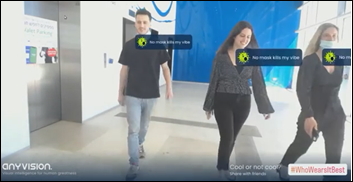
Israel’s largest hospital uses facial recognition software, in conjunction with its existing security cameras, to identify visitors who aren’t wearing masks and give them encouraging messages like, “No mask kills my vibe.”
Other

TechCrunch profiles Peer Medical, a startup that offers lung cancer patients the ability to share treatments with each other using de-identified EHR data. Patients can search Peer Medical’s database by biomarker, stage, age, or gender to review verified treatments and care journeys.
A Surescripts report on health IT adoption finds that e-prescribing and real-time prescription benefit utilization have increased over the last six months.
Two-thirds of Americans who file bankruptcy do so because of healthcare expenses. Experts say a lot of those people have insurance that provides poor financial protection given that only 40% of Americans have enough savings to cover a $1,000 emergency expense.

Points from Epic CEO Judy Faulkner’s online interview with Cleveland Clinic CEO Tom Mihaljevic, MD:
- She was supposed to college summer work at University of Rochester in particle physics, and since she had never seen a computer, they gave her a Fortran book and one week to learn.
- She applied to graduate school in math, but University of Wisconsin moved her without asking to computer science, which she did not know was an option. She worked with informatics pioneer Warner Slack, MD and was later asked to develop a clinical system in the days before commercial EHRs and widespread use of commercial database management software.
- She started Epic as a half-time employee with two half-time assistants, working from a basement.
- She says the Midwest is a great company location because people are friendly and work hard and having a rural footprint means the company has room to put up new buildings as needed.
- Technology is moving from rules-based systems to artificial intelligence, with statistical methods providing ways to issue early alerts for potential sepsis and to manage drug-drug interactions.
- Clinician notes are four times longer in the US than in other countries due to the administrative requirements for getting paid.
- Clinicians should review their software options to make the system work their way, and where that isn’t possible, examine how they do things to see if there’s a better way that the system can support. It’s helpful to have specialist physician builders who know how to configure systems for their specialty.
- Epic has created the role of BFFs, who take the “best friends forever” approach in recognizing and publicizing client innovation and bringing back developments from other clients.
- MyChart is available to 165 million patients. Only 0.5% of MyChart users want to manage their own information, and the even that tiny number falls off with time. Patients want their health system to maintain and exchange their records.
- Epic Cosmos has 60 million customer patient records that are being used for research. Epic is building a “best care for your patient” module that will use this data along with that of the specific patient to provide clinicians with evidence-based recommendations.
Sponsor Updates

- Cerner associates deliver care kits, school supplies, and gift cards to those affected by Iowa’s devastating windstorm.
- Wolters Kluwer publishes “5 Forces for the Future: Virtual care reaching the vulnerable.”
- Frost & Sullivan recognizes Jvion with its 2020 North American Technology Innovation Leadership Award for its Care Optimization and Recommendation Enhancement (CORE) technology.
- Premier takes first place in AHRQ’s Bringing Predictive Analytics to Healthcare Challenge.
- Bumrungrad International Hospital in Thailand uses InterSystems TrakCare Lab Enterprise to create one of the first fully digital microbiology laboratories in the world.
- MDLive works with the Soldiers’ Angels’ Women of Valor Program to offer caregivers of veterans virtual care for physical and mental health.
- NextGate updates the usability, reporting, and performance of its Enterprise Master Patient Index with version 11.
- Goliath Technologies partners with IntraSystems to help IT professionals anticipate, troubleshoot, and document Citrix end-user performance issues.
Blog Posts
- The Right Medical Device Integration Strategy Can Increase the Efficiency of Medical Device Security (Capsule)
- Your Insulin Management Process is Wasting Nurses’ Time (Glytec)
- How to Troubleshoot “Citrix is Slow” for Remote Workers (Goliath Technologies)
- Beginners guide to painless machine learning (Google Cloud)
- Plan Now for New Electronic ADT Notification Requirements (Healthcare Triangle)
- The Post-Pandemic Leadership Conundrum: Balancing Expenses While Investing in Digital Transformation (The HCI Group)
- Telehealth is here to stay. Now what? (HCTec)
- Virtually Kicking Off the 2020 Healthcare Analytics Summit (Health Catalyst)
- Health Literacy Lessons from COVID-19 (Healthwise)
- Healthy People 2030 Elevates Social Determinants of Health (Imat Solutions)
- QPP Proposed Rule for 2021: Update & Analysis (Impact Advisors)
- Growing Our Company Culture While Working from Home (Imprivata)
- Data is Key to COVID-19 Contact Tracing and Syndromic Surveillance (InterSystems)
- Surgical schedules slow to recover even as operating rooms reopen (Intelligent Medical Objects)
- COVID-19: Healthcare Consumerism’s Tipping Point (Loyale Healthcare)
- A Guide to Patient Retention for Physical Therapists (MWTherapy)
- Apart But Not Alone: How Grief Support Prevails Amid a Pandemic (Netsmart)
Contacts
Mr. H, Lorre, Jenn, Dr. Jayne.
Get HIStalk updates.
Send news or rumors.
Contact us.



























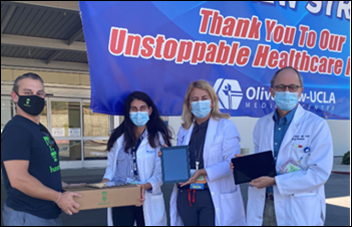



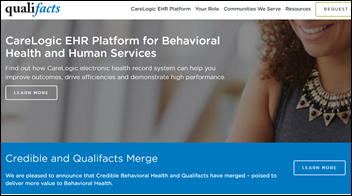



























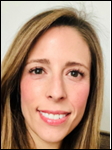











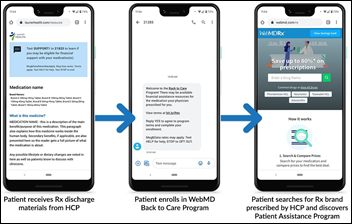






































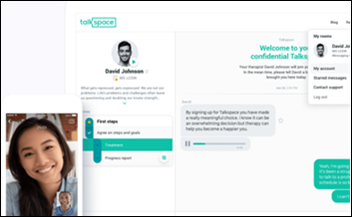


![image[88]_thumb image[88]_thumb](https://histalk2.com/wp-content/uploads/2020/08/image88_thumb.png)
















![image_thumb[59]_thumb image_thumb[59]_thumb](https://histalk2.com/wp-content/uploads/2020/08/image_thumb59_thumb.png)


![image[94]_thumb image[94]_thumb](https://histalk2.com/wp-content/uploads/2020/08/image94_thumb.png)














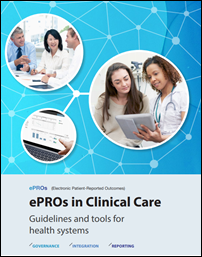














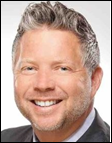








































The New Yorker cartoon of Readers Write articles.